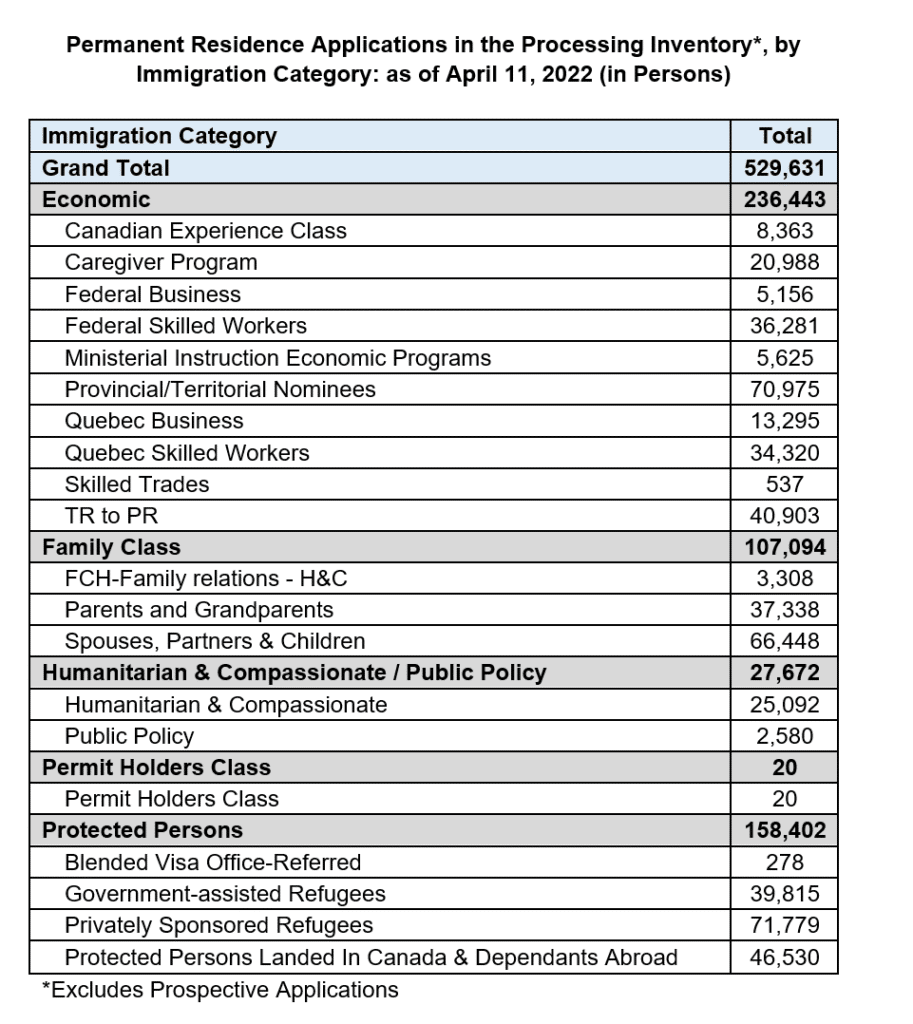IRCC’s temporary residence inventory increased with the introduction of the Canada-Ukraine Authorization for Emergency Travel.
Immigration Canada’s processing inventory now stands at more than 2 million people across all lines of business.
The temporary and permanent residence backlog has increased. Meanwhile, the citizenship backlog went down to about 400,000 persons in April, compared to more than 453,000 in March.
The backlog has progressed as follows since last summer:
- April 11-12, 2022: 2,031,589 persons
- March 15 and 17, 2022: 1,844,424 persons
- February 1, 2022: 1,815,628 persons
- December 15, 2021: 1,813,144 persons
- October 27, 2021: 1,792,404 persons
- July 6, 2021: 1,447,474 persons
CIC News requested new inventory data on April 28. Immigration, Refugees, and Citizenship Canada (IRCC) responded on the same day with April 11 figures. CIC News has put in a follow-up request for the most recent data. CIC News is also reporting the data the same way it was received from IRCC.
CUAET driving the increase
Most of the gains between March and April were seen in the temporary residence inventory. As of April 11, there are more than 1.1 million temporary residence applicants, such as people applying for work and study permits, waiting on processing. On March 17, there were around 870,000 people.
According to an IRCC media spokesperson, the inventory for temporary resident visas and work permits has increased significantly recently with the introduction of the Canada-Ukraine Authorization for Emergency Travel (CUAET). This program allows IRCC to bring people to Canada through existing temporary resident visa processes, networks and infrastructure. It is a temporary residency pathway to Canada and not a refugee program. As of April 29, IRCC has received 180,903 CUAET applications.
| Application type | Persons as of April 11 |
|---|---|
| Study Permits | 122,145 |
| Study Permit Extensions | 34,242 |
| Temporary Resident Visas | 558,498 |
| Visitor Records | 73,450 |
| Work Permits | 172,796 |
| Work Permit Extensions | 141,244 |
| Total | 1,102,375 |
Slight increase among permanent residence applicants but Express Entry is improving amid return to all-program draws in July
On April 11, the permanent residence inventory stood at about 530,000 people, up from nearly 519,000 in March. Slight increases were experienced across each permanent residence category.
| Immigration Category | Persons as of April 11 | Persons as of March 15 |
|---|---|---|
| Economic | 236,443 | 230,767 |
| Family Class | 107,094 | 103,112 |
| Humanitarian & Compassionate | 27,672 | 27,218 |
| Permit Holders Class | 20 | 18 |
| Protected Persons | 158,402 | 157,552 |
| Total | 529,631 | 518,667 |
There has been a reduction in the Express Entry backlog. In April, there were more than 45,000 Express Entry applicants waiting on decisions, down from about 52,000 in March.
The reduction in Express Entry files was the impetus that led Immigration Minister Sean Fraser to announce that all-program draws will resume in July, and processing times will return to six months for most new applicants. Rounds of invitation have been temporarily paused for the Federal Skilled Worker Program (FSWP) since December 2020. Canadian Experience Class (CEC) candidates have not seen a draw since September 2021. Express Entry is the main way IRCC welcomes skilled immigrants.
| Immigration Program | Persons as of April 11 | Persons as of March 15 |
|---|---|---|
| Canadian Experience Class | 8,363 | 10,338 |
| Federal Skilled Worker Program | 36,281 | 41,336 |
| Federal Skilled Trades | 537 | 589 |
| Total | 45,181 | 52,263 |

Conclusion
IRCC continues to grapple with a large inventory exacerbated by the pandemic. IRCC has a budget of $85 million to reduce wait times for newcomers. This funding builds on the work that IRCC has already done to reduce wait times, such as hiring new processing staff, digitizing applications, and reallocating work among IRCC offices around the world. Despite these efforts, many people continue to experience wait times far in excess of IRCC’s standards. IRCC announced in January its intention to bring service standards back to normal for a variety of lines of business by the end of this year.



